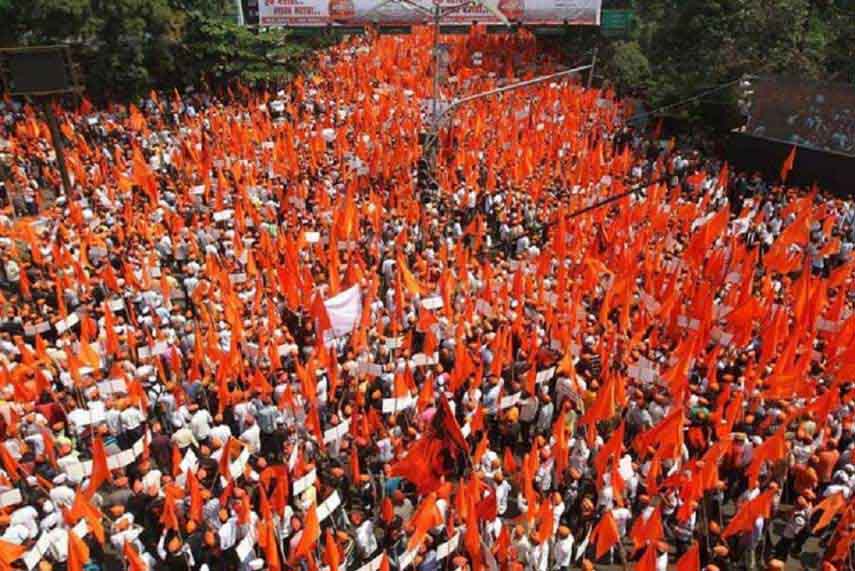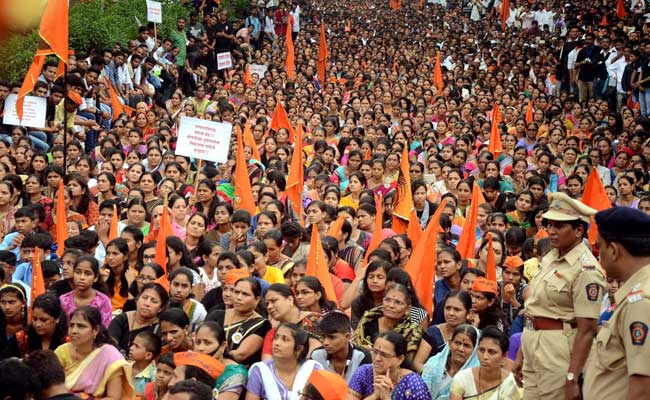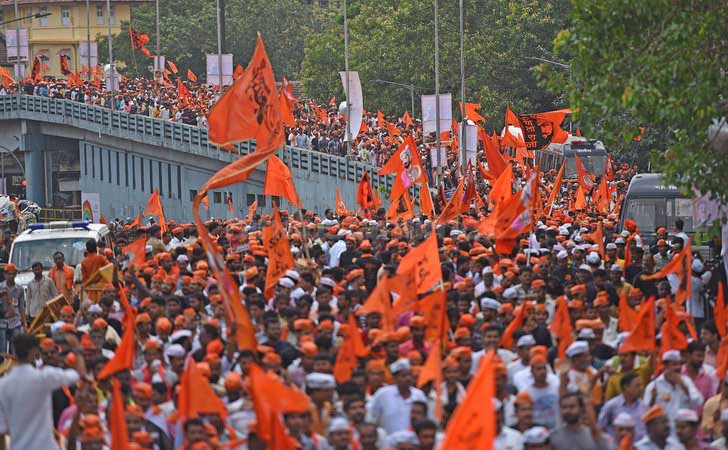Supreme Court cancellation of Maratha Reservation is injustice says Thamizh Thesiya Periyakkam
On 5 May, a five-member bench of India’s Supreme Court, through a 3-2 verdict, annulled the reservation given to Marathas -as rights of the Backward, and Most backward class communities through the reservation policy of Maharashtra, calling it unequal. The Supreme Court order compliments the Union-centric approach of the present government. Tamil nationalist body Thamizh Thesiya Periyakkam has opposed the order and called it a usurpation of the rights of the sons of the soil by the apex court of India. The learned President of the body Periyasamy Maniarasan traces the path of the demand for reservation for backward class communities culminating in reservation in education and employment, which has now been annulled.
![On 5 May, a five-member bench of India’s Supreme Court, through a 3-2 verdict, annulled the reservation given to Marathas -as rights of the Backward, and Most backward class communities through the reservation policy of Maharashtra, calling it unequal. The Supreme Court order compliments the Union-centric approach of the present government. Tamil nationalist body Thamizh Thesiya Periyakkam has opposed the order and called it a usurpation of the rights of the sons of the soil by the apex court of […]](https://www.theworldsikhnews.com/wp-content/uploads/2021/05/Mratha-Marcha-360x266.jpg)
THE SUPREME COURT OF INDIA HAS QUASHED the Socially and Educationally Backward Classes (SEBC) Act, 2018 of the government of the state of Maharashtra, saying “people from the community can’t be declared educationally and socially-backward just to bring them in the reserved category.”
In Maharashtra, Marathas population is about 30%. They are the sons of the soil. They are traditional farmers. Farmers of own land and landless form the major portion of the Maratha people. From the beginning, they were not enjoying the reservation for their community.

BJP Chief Minister Devendra Fadnavis amended the Socially and Educationally Backward Classes (SEBC) Reservation Act and added the Maratha community, and thereafter, the Marathas benefited from the reservation. Marathas achieved this as a result of their sustained struggle claiming this right.

The amendment to the SEBC Reservation Act was challenged vide a case titled Dr Jayshree Lakshmanrao Patel Vs Chief Minister of Maharashtra (CA 3123 of 2020). However, the High Court of Maharashtra upheld the amendment.
This judgement of the Supreme Court has hit the backward class communities of other states as well.
Subsequently, a five-member tribunal headed by Justice Ashok Bhushan, and consisting of justices L. Nageswara Rao, S. Abdul Nazeer, Hamant Gupta, and S. Ravindra Bhutt heard this case. On 05-05-2021 the tribunal delivered the judgement that says that the Amendment act that provides reservation to the Marathas’ invalid.
This judgement has hit the backward class communities of other states as well.
 It was the talk of Maharashtra that not offering reservation benefits to the Marathas was a great injustice to the Marathas. During 2016 and 2017 Maratha people conducted huge struggles for getting reservation benefits. As a result, Justice M. G. Gaikwad Committee constituted by the BJP government in Maharashtra recommended 16% reservation to the Maratha people. In the case filed against the recommendation of the Gaikwad committee, the Supreme Court rejected the recommendation.
It was the talk of Maharashtra that not offering reservation benefits to the Marathas was a great injustice to the Marathas. During 2016 and 2017 Maratha people conducted huge struggles for getting reservation benefits. As a result, Justice M. G. Gaikwad Committee constituted by the BJP government in Maharashtra recommended 16% reservation to the Maratha people. In the case filed against the recommendation of the Gaikwad committee, the Supreme Court rejected the recommendation.
After that, in the case filed against the Amendment Act which provided reservation for the Marathas, the High Court of Maharashtra during June 2019 delivered a judgement that Marathas may be given 12% reservation in education and 13% in employment. Accordingly, the state BJP government made amendments to the Act.
This corrected act has been challenged in the Supreme Court and in this case only the Supreme Court has delivered such a judgement which abrogates the right of getting the benefits of reservation to Marathas.
The Supreme Court has delivered such a judgement which abrogates the right of getting the benefits of reservation to Marathas.
Previously, there was no reservation to the Backward class communities in the education and employment of government services. Under the pressure of the social organizations for social justice, on 1 January 1979, the then Prime Minister Morarji Desai constituted a second Commission for studying the issue of reservation for Backward Class communities under the head of B. P. Mandal. The Mandal Commission submitted its report in December 1980. Meanwhile, the new government was in power. Indira Gandhi and her successor Rajiv Gandhi did not implement the Mandal Commission’s recommendations.
In the report, there were several recommendations for the development of the backward communities, and one of them was to give the benefit of reservation of 27% in education and employment.
The report was idling until the National Progressive Alliance government came to power. The Prime Minister Vishwanath Partap Singh, on 13 August 1990, 27% reservation in employment to the backward class communities as per the Mandal Commission report. Consequently, the BJP withdrew its support to the V. P. Singh’s government. The Congress party and the BJP jointly defeated the NPA government headed by V. P. Singh.
Some people filed cases in the Supreme Court against the implementation of the 27% reservation to the BC as ordered by V.P. Singh and the Supreme Court immediately stayed the order from implementation.

In 1991, P. V. Narasimha Rao of the Indian National Congress became the Prime Minister. He took up the issue which was stumbling without any progress but with a fresh perspective. He introduced certain commitments to the recommendation of the Mandal Commission and issued orders on 25 September 1991, that provided 10% reservation to the newly identified class called ‘economically backward” which was never offered the benefit of reservation apart from the 27% reservation as ordered by the V. P. Singh as per the original recommendation of the Mandal Commission.
Against this order of Narasimha Rao also, cases were filed in the Supreme Court which transferred the file to a 9-member constitutional tribunal.
Arya Brahmins and Arya Vaishyars had as their tactic to keep the status of the backward class people who are in a huge majority in the same backward stage to retain their superiority over them in India. The judiciary too is always under their control. The High Courts and Supreme Court are under the control of Arya Brahmins and Arya Vaishyas, specifically the Arya Brahmins.
The Constitutional bench which comprised Chief Justice A.M. Venkatachalaiha as head and justices A.M.Ahmadi, M. Kania, S. Rathinavel Pandian, K.Singh, P. Shavant, R. Sahai, P. J. Reddy and one other, delivered its judgement on 26 November 1992. It upheld the implementation of 27% reservation to the Backward Class, but at the same time imposed two conditions as follows:
(i) The reservation will not be applicable to the backward class people of the creamy layer and
(ii) Unless under extraordinary circumstances, the total percentage of reservation either in the central or state government should not exceed 50%.
However, the same 9-member tribunal declared null and void the 10% reservation offered by the Narasimha Rao government to the economically backward communities. It categorically said that the Constitution provides for the reservation to the educationally and socially backward communities only and not for economically backward communities.
 The reason to abrogate the provision for a reservation to Marathas, given by the current 5-member bench is that there was already 52% reservation to various classes were in force, and therefore the additional 25% (12 + 13) reservation for Marathas would be against the judgement in the Mandal case (Indira Sahani case).
The reason to abrogate the provision for a reservation to Marathas, given by the current 5-member bench is that there was already 52% reservation to various classes were in force, and therefore the additional 25% (12 + 13) reservation for Marathas would be against the judgement in the Mandal case (Indira Sahani case).
The second reason is the 102nd constitutional amendment act enacted by the Modi-Mohan Bhagwat’s government during the year 2019. This 2019 constitutional Amendment act added sub-clauses 338B, 342A, 366(26c). Article 338 provides for the constitution of a Tribunal for the Scheduled Castes and its procedural formalities.
According to the presently added 9 provisions to Article 338B vide 102nd amendment, the National Commission for Backward Classes has been made a constitutional body.
Its 9th sub-clause provides for the condition that the Union and every State Government shall consult the Commission on all major policy matters affecting socially and educationally backward classes. It means that the Commission is effectively a barrier in the execution of the free will of the states to do any good to the Backward class people.

The 102nd amendment added a new clause 342A and there are two sub-clauses. Sub-clause 342A(1) empowers the President to identify, prepare, and notify the list of backward class communities after consulting the respective state governments. Only the communities listed will be benefitted from the laws enacted by the Union and the State governments.
Sub-clause 342(2) empowers the parliament to delete a community that is educationally and socially backward from the list or add a community afresh to the list.
Thirdly, the 102nd amendment added a new sub-clause 26c in Article 366. It more specifically defines that “socially and educationally backward classes” means the backward classes as are so deemed under article 342A.
In his judgement, one of the 5 judges -Justice S. Ravindra Bhutt has stated as follows:
‘As per Article 342A(1) the President (Union government) only can add a community in the list of backward class communities and the list notified by the President only should be dealt with by any state and the union territories. Only the communities listed can avail of any special benefits offered by the constitutional provisions. As the Marathas as a community is not in the list notified by the President the notification of Marathas as the backward class community by the Maharashtra government is not valid.’
Significantly, the High Court of Maharashtra has accepted the reservation to the Marathas community and the judges who so ordered are well versed with the Indian constitution and other laws. The state’s social and political environment influences the judges of the High Court of Maharashtra, but in the case of judges in Delhi, the psyche of their own family and social background influences them.
Justice L. Nageswara Rao and Justice Hamant Gupta agreed to the verdict of Justice S. Ravindra Bhutt. The argument advanced by the Solicitor General that the state governments have the right to notify the backward class communities in the states was not agreed to by these three judges.
Justice Ashok Bhushan and Justice S. Abdul Nazeer did not agree and stated that the state governments have the right to notify the backward class communities in the state and to implement the provisions of the law in favour of them. However, the majority decision came into effect.
WHAT IS THE SOLUTION?
Since the time when a law was contemplated for the reservation benefit of backward class communities, there were many who actively worked against the policy of reservation to BC in the Constitutional Assembly and the Parliament.
Arya Brahmins and Arya Vaishyars had as their tactic to keep the status of the backward class people who are in a huge majority in the same backward stage to retain their superiority over them in India. The judiciary too is always under their control. The High Courts and Supreme Court are under the control of Arya Brahmins and Arya Vaishyas, specifically the Arya Brahmins.
 Retired judge Hari Paranthaman once grieved over that there was not a single judge belonging to the backward class in the Supreme Court. The total number of judges in the Supreme Court is 34 and at present only 27 are incumbents. Of these 27 no one is from the backward class. There is no representation of backward, Schedule caste and scheduled tribe communities in the posts of judges in High courts and the Supreme courts despite there are eligible candidates from these communities for an appointment. The Supreme Court and the High Courts must also follow the reservation policy and appoint such judges.
Retired judge Hari Paranthaman once grieved over that there was not a single judge belonging to the backward class in the Supreme Court. The total number of judges in the Supreme Court is 34 and at present only 27 are incumbents. Of these 27 no one is from the backward class. There is no representation of backward, Schedule caste and scheduled tribe communities in the posts of judges in High courts and the Supreme courts despite there are eligible candidates from these communities for an appointment. The Supreme Court and the High Courts must also follow the reservation policy and appoint such judges.
Significantly, the High Court of Maharashtra has accepted the reservation to the Marathas community and the judges who so ordered are well versed with the Indian constitution and other laws. The state’s social and political environment influences the judges of the High Court of Maharashtra, but in the case of judges in Delhi, the psyche of their own family and social background influences them.
Article 342 which empowers the Union government to decide on what are the castes that can be scheduled should be abolished, and also article 342A that empowers such power in the case of the backward class should be omitted. The right to decide what are castes to be scheduled and what are the castes to be notified should rest with the State government only.
This should be so because people belong to states and not to the union. They live in their states. The Union government has no people for itself. The Union government does not know the local social and educational status of the people. Had the Supreme Court decided so, it would have been an appropriate justice, developmental to democracy and social justice.
Those who think of One India as their motherland without any mental attachment to the states, could not understand India which has various sects of people who are psychologically attached to their motherland and conscious of their birthrights regarding their mother nation.
It is noteworthy that in the past, the multiplicity of races and castes has created splits within the BJP itself. During 2018, Maharashtra BJP only understood and offered the benefit of reservation policy to the Marathas who were suffering without livelihood because of the failure of agriculture in the state. At the centre the BJP contradicted with the state BJP and enacted an amendment law to the effect that the power to identify the backward community in a state rests with the Union government in the same year 2018, thus defeating the decision of the state government and undermining the state government’s psychological understanding of the status of the people of the state.
Now too, a deepening conflict amongst the state BJP and its central counterpart is inevitable.
The Mandal Commission was constituted primarily to recommend steps to be taken for the advancement of the backward class within the framework of the Constitution. As per the Commission’s recommendation, 27% reservation benefits were earmarked by the Union government for backward communities. In the case filed against this, the Justice Venkatachaliah-headed tribunal upheld the decision of the Union government. While upholding the decision, there was no necessity to impose a condition that the total reservation should not exceed 50%? Even in that case, Justice Rathinavel Pandian who belonged to Thamizhnaadu registered his denial to the Commission’s condition of 50% limitation.
 Further, the case was related to the central government jobs. What was the necessity to be ferocious on the exceeding of 50% limitation by the state governments? The reason is the psyche that the people of the backward class community should not grow equal to the people whom the judges hail from.
Further, the case was related to the central government jobs. What was the necessity to be ferocious on the exceeding of 50% limitation by the state governments? The reason is the psyche that the people of the backward class community should not grow equal to the people whom the judges hail from.
Justice Ravindra Bhutt’s verdict which was based on the majority decision says that the Union government should seek the opinion of the state government but the power to take a final decision is with the central government. What is the use of consulting? The judge agrees that consulting the state government amounts to eyewash only.
Ashok Bhushan and Ravindra Bhutt did not comment a word about the 10% reservation given to the economically backward forward communities. The reservation of 10% to this class exceeds the limit of 50% to 60%. The reason is well known.
WHAT IS NEXT, DIVISION OF THE STATES?
The Mohan Bhagwat-Modi’s government is busy aggressively taking away successively the meagre number of rights which the Congress government had left. The ultimate plan of the BJP is to remove completely the community-based reservation policy which lays small impediments to the progressive domination of the Varnashrama policy.
The 102nd constitutional amendment which has usurped the state’s right to identify and add a backward class community to the list of backward class communities and implement the reservation policy to that community is the first step towards its goal. This amendment bill was passed without any opposition in the parliament or outside of it. This shame is the outcome of unawareness on the part of those who care about democracy and communal rights.
The Mohan Bhagwat-Modi’s government is busy aggressively taking away successively the meagre number of rights which the Congress government had left. The ultimate plan of the BJP is to remove completely the community-based reservation policy which lays small impediments to the progressive domination of the Varnashrama policy.
The verdicts from time to time have distorted the reservation policy for backward class and then curtailed the reservation policy for Scheduled Castes and Tribes. What is left is only for the namesake. The RSS-BJP’s next joint venture is to divide all the states into small administrative units and destroy the motherlands based on various national races and their languages.
WHAT WOULD BE THE FATE OF THE 69% RESERVATION POLICY OF THAMIZHNAADU?
It would be naive to think that the headache is only in Maharashtra. Thamizhs should understand that the taking away of the states right regarding the backward class in the state of Maharashtra is the destroyer-forerunner of the 69% reservation policy in force in Thamizhnaadu.
The ruling party in Thamizhnaadu should object to and prevent Union governments from taking away the right of social justice and propose alternative plans to regain the lost rights. Unless we raise our voice, the union government will continue its usurpation ceaselessly.
It will be interesting to see what the Maharashtra government committee of retired HC judges suggests after studying the Supreme Court verdict.
All the political parties, social organizations, and the people of Thamizhnaadu should defend themselves by mobilizing publicly and raise a common slogan for retrieving the rights of balancing social justice. Minimally, our immediate aim should be:
- Cancellation of the 102nd constitutional amendment.
- Constitution of a 9-member bench of the Supreme Court of India to reconsider the verdict of the 5-member tribunal which denied reservation to Marathas in Maharashtra.
- The Narendra Modi government should consider positively the Solicitor General’s view that the states have the right to identify and notify backward communities. He should proclaim that his government will take action for offering reservation to Marathas backward community.
